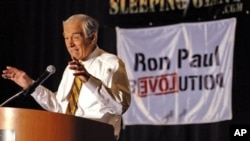A year-and-a-half ahead of the next US presidential election, five potential candidates from the Republican party came together in Greenville, South Carolina for a debate broadcast nationally on the Fox News Network. The topics ranged from the war in Afghanistan to high gasoline prices and the national debt.
The hour-and-a-half-long debate began with questions about the killing of terrorist leader Osama bin Laden on Sunday and US policy in Afghanistan, the Middle East and North Africa. Congressman Ron Paul, who opposes all US involvement abroad, including foreign aid, called for a withdrawal of US troops from Afghanistan.
"We went to Afghanistan to get him and he hasn't been there," said Paul. "Now that he is killed, boy, this is a wonderful time for this country now to reassess and get the troops out of Afghanistan and end that war that has not helped us and has not helped anyone in the Middle East."
Former Pennsylvania senator Rick Santorum said that the parts of President Obama's foreign policy that have worked the best are the ones from the Bush administration he has continued, including the hunt for bin Laden.
President Obama's policy on Libya was attacked from two angles in the debate. Former Godfather Pizza CEO Herman Cain, the only black candidate and a tea party favorite, said the president had gone into Libya without a clear strategy and now risks having the situation escalate. But Governor Tim Pawlenty criticized President Obama for not acting decisively, in early March, when he said the removal of Moammar Gadhafi might have been achieved quickly.
"Had the president been decisive in that moment, the rebels had taken over most of the country geographically, they had the momentum, they had Gadhafi on the ropes, he was openly talking about leaving voluntarily, according to news reports, and we could shoved him out at that moment," said Pawlenty.
On the question of enhanced interrogation, which some critics say amounts to torture, all the candidates said they supported its use in some circumstances except for Congressman Paul and former New Mexico Governor Gary Johnson.
On the issue of immigration, Herman Cain said he backed the right of states like Arizona to make their own laws because the federal government has failed to address the problem. But Gary Johnson, who served as governor in the border state of New Mexico from 1995 to 2003, said immigration is a benefit to the nation and should be encouraged through an expansion of the legal process.
"I think we should make it as easy as possible to get a work visa," said Johnson. "A work visa would not be citizenship or a green card, but it would be a background check and a Social Security card so that applicable taxes would be paid. Immigration needs to be about work, not welfare."
Johnson has strong support among some sectors of the conservative tea party movement, but his more liberal views on such issues as abortion and legalization of marijuana set him apart from social conservatives.
None of the five men who were on stage in South Carolina are considered top tier candidates, except for former Minnesota Governor Tim Pawlenty, who currently trails other potential candidates in polls in key primary states like Iowa. Among the prominent Republicans who may take part in upcoming debates are former Massachusetts Governor Mitt Romney, real estate tycoon and television star Donald Trump and Minnesota Congresswoman Michelle Bachman.




